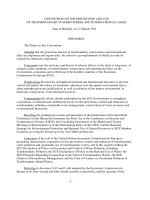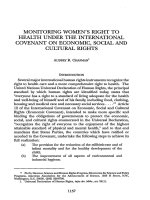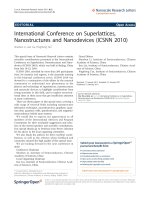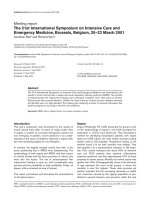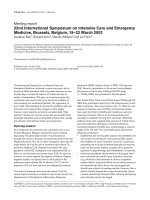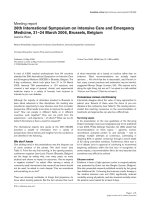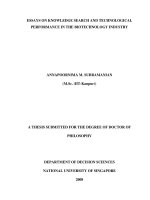INTERNATIONAL CONVENTION ON MARITIME SEARCH AND RESCUE, 1979
Bạn đang xem bản rút gọn của tài liệu. Xem và tải ngay bản đầy đủ của tài liệu tại đây (702.64 KB, 48 trang )
No. 23489
MULTILATERAL
International Convention on maritime search and rescue,
1979 (with annex). Concluded at Hamburg on 27 April
1979
Authentic texts: Chinese, English, French, Russian and Spanish.
Registered by the International Maritime Organization on 27 August 1985.
MULTILATERAL
Convention internationale de 1979 sur la recherche et
le sauvetage maritimes (avec annexe). Conclue
Hambourg le 27 avril 1979
Textes authentiques : chinois, anglais, français, russe et espagnol.
Enregistrée par l'Organisation maritime internationale le 27 août 1985.
Vol. 1405, 1-23489
1985
United Nations — Treaty Series
•
Nations Unies — Recueil des Traités
119
INTERNATIONAL CONVENTION 1 ON MARITIME SEARCH AND
RESCUE, 1979
The Parties to the Convention,
Noting the great importance attached in several conventions to the rendering
of assistance to persons in distress at sea and to the establishment by every
coastal State of adequate and effective arrangements for coast watching and for
search and rescue services,
Having considered Recommendation 40 adopted by the International Con
ference on Safety of Life at Sea, I960,2 which recognizes the desirability of co
ordinating activities regarding safety on and over the sea among a number of inter
governmental organizations,
Desiring to develop and promote these activities by establishing an interna
tional maritime search and rescue plan responsible to the needs of maritime
traffic for the rescue of persons in distress at sea,
Wishing to promote co-operation among search and rescue organizations
around the world and among those participating in search and rescue operations
at sea,
1 Came into force on 22 June 1985, i.e., 12 months after the date on which 15 States had signed it definitively
or deposited an instrument of ratification, acceptance, approval or accession with the Secretary-General of the
International Maritime Organization, in accordance with article V (I):
Date of definitive
signature (s)
or of deposit
of the instrument
of ratification,
acceptance (A).
Date of definitive
signature (s)
or of deposit
of the instrument
of ratification,
acceptance (A).
Ulule
or accession (a)
State
or accession (a)
Algeria .....................
5 January
1983 a
tion to the Cook Islands and
Argentina ................... 18 May
1981 a
Niue.)
Australia ............
7 November 1983 a
Norway ..................... 9 December 1981
(With a declaration.)'
Sweden ..................... 27 September 1982 a
Barbados ................... 25 July
1983 a
United Kingdom of Great
Belgium .................... 28 February 1985 a
Britain and Northern Ire
Brazil ...................... 22 September 1982 a
land ...................... 22 May
1980 s
Canada ..................... 18 June
1982 a
(With a declaration*** con
Chile .......................
7 October
1981
cerning Gibraltar and a dec
Denmark .................... 21 June
1984
laration of application to
France ......................
9 April
1980i
the Bailiwick of Jersey, the
German Democratic Republic .. 22 April
1985 a
Bailiwick of Guernsey, the
Germany, Federal Republic of 21 January
1982
Isle of Man, St. Christopher(With a declaration of applica
Nevis-Anguilla, Belize, Ber
tion to Berlin (West).)**
muda, the British Virgin
Japan ....................... 10 June
1985 a
Islands and Hong Kong.)
Netherlands .................
8 July
1982 A
United States of America ..
12 August
1980
New Zealand ................ 26 April
1985 a
(With a declaration of applica* See p. 186 of this volume for the text of the declaration made upon accession.
** See p. 186 of this volume for the text of the declaration made upon ratification.
*** See p. 187 of this volume for the text of the declaration made upon definitive signature.
In addition, the Secretary-General of the International Maritime Organization received notifications of decla
rations made by the Governments of Belize, Chile, the Federal Republic of Germany, Saint Christopher and
Nevis, the United Kingdom of Great Britain and Northern Ireland and the Union of Soviet Socialist Republics.
For the text of the declarations see p. 250 of this volume.
2 United Nations, Treaty Series, vol. 536, p. 456.
Vol. 1405, 1-23489
120______United Nations — Treaty Series
•
Nations Unies — Recueil des Traités______1985
Have agreed as follows:
Article I. GENERAL OBLIGATIONS UNDER THE CONVENTION
The Parties undertake to adopt all legislative or other appropriate measures
necessary to give full effect to the Convention and its Annex, which is an integral
part of the Convention. Unless expressly provided otherwise, a reference to the
Convention constitutes at the same time a reference to its Annex.
Article II. OTHER TREATIES AND INTERPRETATION
(1) Nothing in the Convention shall prejudice the codification and devel
opment of the law of the sea by the United Nations Conference on the Law of
the Sea convened pursuant to resolution 2750 (XXV) of the General Assembly of
the United Nations' nor the present or future claims and legal views of any State
concerning the law of the sea and the nature and extent of coastal and flag State
jurisdiction.
(2) No provision of the Convention shall be construed as prejudicing
obligations or rights of vessels provided for in other international instruments.
Article III. AMENDMENTS
(1) The Convention may be amended by either of the procedures specified
in paragraphs (2) and (3) hereinafter.
(2) Amendment after consideration within the Inter-Governmental Mari
time Consultative Organization (hereinafter referred to as the Organization):
(a) Any amendment proposed by a Party and transmitted to the SecretaryGeneral of the Organization (hereinafter referred to as the Secretary-General),
or any amendment deemed necessary by the Secretary-General as a result of an
amendment to a corresponding provision of Annex 12 to the Convention on Inter
national Civil Aviation, 2 shall be circulated to all Members of the Organization
and all Parties at least six months prior to its consideration by the Maritime
Safety Committee of the Organization.
(b) Parties, whether or not Members of the Organization, shall be entitled to
participate in the proceedings of the Maritime Safety Committee for the consid
eration and adoption of amendments.
(f) Amendments shall be adopted by a two-thirds majority of the Parties
present and voting in the Maritime Safety Committee on condition that at least
one third of the Parties shall be present at the time of adoption of the amendment.
(d) Amendments adopted in accordance with sub-paragraph (c) shall be com
municated by the Secretary-General to all Parties for acceptance.
(e) An amendment to an Article or to paragraphs 2.1.4, 2.1.5, 2.1.7, 2.1.10,
3.1.2 or 3.1.3 of the Annex shall be deemed to have been accepted on the date
on which the Secretary-General has received an instrument of acceptance from
two thirds of the Parties.
' United Nations, Official Reeunls of the Général Assembly, Twenty-fifth Seaion. Supplement Nn. 28
(A/8028), p. 25.
2 United Nations, Treaty Series, vol. 15, p. 295. For the texts of the Protocols amending this Convention,
see vol. 320, pp. 209 and 217; vol. 418. p. 161; vol. 514, p. 209; vol. 740, p. 21; vol. 893, p. 117; vol. 958, p. 217;
vol. 1008, p. 213, and vol. 1175, p. 297.
Vol. 1405, 1-23489
1985
United Nations — Treaty Series
•
Nations Unies — Recueil des Traités______121
(/) An amendment to the Annex other than to paragraphs 2.1.4, 2.1.5, 2.1.7,
2.1.10, 3.1.2 or 3.1.3 shall be deemed to have been accepted at the end of one year
from the date on which it is communicated to the Parties for acceptance. How
ever, if within such period of one year more than one third of the Parties notify
the Secretary-General that they object to the amendment, it shall be deemed not
to have been accepted.
(g) An amendment to an Article or to paragraphs 2.1.4, 2.1.5, 2.1.7, 2.1.10,
3.1.2 or 3.1.3 of the Annex shall enter into force:
(i) With respect to those Parties which have accepted it, six months after the
date on which it is deemed to have been accepted;
(ii) With respect to those Parties which accept it after the condition mentioned
in sub-paragraph (e) has been met and before the amendment enters into
force, on the date of entry into force of the amendment;
(iii) With respect to those Parties which accept it after the date on which the
amendment enters into force, 30 days after the deposit of an instrument of
acceptance.
(h) An amendment to the Annex other than to paragraphs 2.1.4, 2.1.5, 2.1.7,
2.1.10, 3.1.2 or 3.1.3 shall enter into force with respect to all Parties, except those
which have objected to the amendment under sub-paragraph (f) and which have
not withdrawn such objections, six months after the date on which it is deemed
to have been accepted. However, before the date set for entry into force, any
Party may give notice to the Secretary-General that it exempts itself from giving
effect to that amendment for a period not longer than one year from the date of its
entry into force, or for such longer period as may be determined by a two-thirds
majority of the Parties present and voting in the Maritime Safety Committee at
the time of the adoption of the amendment.
(3) Amendment by a conference:
(a) Upon the request of a Party concurred in by at least one third of the
Parties, the Organization shall convene a conference of Parties to consider amend
ments to the Convention. Proposed amendments shall be circulated by the
Secretary-General to all Parties at least six months prior to their consideration
by the conference.
(b) Amendments shall be adopted by such a conference by a two-thirds
majority of the Parties present and voting, on condition that at least one third of
the Parties shall be present at the time of adoption of the amendment. Amend
ments so adopted shall be communicated by the Secretary-General to all Parties
for acceptance.
(c) Unless the conference decides otherwise, the amendment shall be deemed
to have been accepted and shall enter into force in accordance with the proce
dures specified in sub-paragraphs (2)(e), (2)(f), (2)(g) and (2)(/z) respectively,
provided that reference in sub-paragraph (2)(/z) to the Maritime Safety Committee
expanded in accordance with sub-paragraph (2)(£) shall be taken to mean
reference to the conference.
(4) Any declaration of acceptance of, or 'objection to, an amendment or
any notice given under sub-paragraph (2)(/j) shall be submitted in writing to the
Secretary-General who shall inform all Parties of any such submission and the date
of its receipt.
Vol. 1405. 1-23489
122______United Nations — Treaty Series
•
Nations Unies — Recueil des Traités______1985
(5) The Secretary-General shall inform States of any amendments which
enter into force, together with the date on which each such amendment enters
into force.
Article IV.
SIGNATURE, RATIFICATION, ACCEPTANCE,
APPROVAL AND ACCESSION
(1) The Convention shall remain open for signature at the Headquarters
of the Organization from 1 November 1979 until 31 October 1980 and shall there
after remain open for accession. States may become Parties to the Convention by:
(a) Signature without reservation as to ratification, acceptance or approval; or
(b) Signature subject to ratification, acceptance or approval, followed by ratifica
tion, acceptance or approval; or
(c) Accession.
(2) Ratification, acceptance, approval or accession shall be effected by the
deposit of an instrument to that effect with the Secretary-General.
(3) The Secretary-General shall inform States of any signature or of the
deposit of any instrument of ratification, acceptance, approval or accession and
the date of its deposit.
Article V. ENTRY INTO FORCE
(1) The Convention shall enter into force 12 months after the date on
which 15 States have become Parties to it in accordance with Article IV.
(2) Entry into force for States which ratify, accept, approve or accede to the
Convention in accordance with Article IV after the condition prescribed in para
graph (1) has been met and before the Convention enters into force, shall be on
the date of entry into force of the Convention.
(3) Entry into force for States which ratify, accept, approve or accede to
the Convention after the date on which the Convention enters into force shall be
30 days after the date of deposit of an instrument in accordance with Article IV.
(4) Any instrument of ratification, acceptance, approval or accession
deposited after the date of entry into force of an amendment to the Convention
in accordance with Article III shall apply to the Convention, as amended, and
the Convention, as amended, shall enter into force for a State depositing such an
instrument 30 days after the date of its deposit.
(5) The Secretary-General shall inform States of the date of entry into force
of the Convention.
Article VI. DENUNCIATION
(1) The Convention may be denounced by any Party at any time after the
expiry of five years from the date on which the Convention enters into force for
that Party.
(2) Denunciation shall be effected by the deposit of an instrument of
denunciation with the Secretary-General who shall notify States of any instrument
of denunciation received and of the date of its receipt as well as the date on which
such denunciation takes effect.
Vol. 1405. 1-23489
1985 ___
United Nations — Treaty Series
•
Nations Unies — Recueil des Traités______123
(3) A denunciation shall take effect one year, or such longer period as may
be specified in the instrument of denunciation, after its receipt by the SecretaryGeneral.
Article VII.
DEPOSIT AND REGISTRATION
(1) The Convention shall be deposited with the Secretary-General who
shall transmit certified true copies thereof to States.
(2) As soon as the Convention enters into force, the Secretary-General
shall transmit the text thereof to the Secretary-General of the United Nations for
registration and publication, in accordance with Article 102 of the Charter of the
United Nations.
Article VIII. LANGUAGES
The Convention is established in a single copy in the Chinese, English,
French, Russian and Spanish languages, each text being equally authentic.
Official translations in the Arabic, German and Italian languages shall be prepared
and deposited with the signed original.
DONE at Hamburg this twenty-seventh day of April one thousand nine
hundred and seventy-nine.
IN WITNESS WHEREOF the undersigned, being duly authorized by their
respective Governments for that purpose, have signed the Convention.
Vol. 1405, 1-23489
124______United Nations — Treaty Series
•
Nations Unies — Recueil des Traités______1985
ANNEX
Chapter I. TERMS AND DEFINITIONS
1.1 "Shall" is used in the Annex to indicate a provision, the uniform application
of which by all Parties is required in the interest of safety of life at sea.
1.2 "Should" is used in the Annex to indicate a provision, the uniform applica
tion of which by all Parties is recommended in the interest of safety of life at sea.
1.3 The terms listed below are used in the Annex with the following meanings:
.1 "Search and rescue region". An area of defined dimensions within which search
and rescue services are provided.
.2 "Rescue co-ordination centre". A unit responsible for promoting efficient
organization of search and rescue services and for co-ordinating the conduct of search and
rescue operations within a search and rescue region.
.3 "Rescue sub-centre". A unit subordinate to a rescue co-ordination centre estab
lished to complement the latter within a specified area within a search and rescue region.
.4 "Coast watching unit". A land unit, stationary or mobile, designated to maintain
a watch on the safety of vessels in coastal areas.
.5 "Rescue unit". A unit composed of trained personnel and provided with equip
ment suitable for the expeditious conduct of search and rescue operations.
.6 "On-scene commander". The commander of a rescue unit designated to co
ordinate search and rescue operations within a specified search area.
.7 "Co-ordinator surface search". A vessel, other than a rescue unit, designated
to co-ordinate surface search and rescue operations within a specified search area.
.8 "Emergency phase". A generic term meaning, as the case may be, uncertainty
phase, alert phase or distress phase.
.9 "Uncertainty phase". A situation wherein uncertainty exists as to the safety of a
vessel and the persons on board.
.10 "Alert phase". A situation wherein apprehension exists as to the safety of a
vessel and of the persons on board.
.11 "Distress phase". A situation wherein there is a reasonable certainty that a
vessel or a person is threatened by grave and imminent danger and requires immediate
assistance.
.12 "To ditch". In the case of an aircraft, to make a forced landing on water.
Chapter 2. ORGANIZATION
2.1 Arrangements for provision and co-ordination of search and rescue services
2.1.1 Parties shall ensure that necessary arrangements are made for the provision
of adequate search and rescue services for persons in distress at sea round their coasts.
2.1.2 Parties shall forward to the Secretary-General information on their search and
rescue organization and later alterations of importance, including:
.1 National maritime search and rescue services;
.2 Location of established rescue co-ordination centres, their telephone and telex
numbers and areas of responsibility; and
.3 Principal available rescue units at their disposal.
2.1.3 The Secretary-General shall in a suitable way transmit to all Parties the
information referred to in paragraph 2.1.2.
Vol. 1405, 1-23489
1985
United Nations — Treaty Series
•
Nations Unies — Recueil des Traités
125
2.1.4 Each search and rescue region shall be established by agreement among
Parties concerned. The Secretary-General shall be notified of such agreement.
2.1.5 In case agreement on the exact dimensions of a search and rescue region is
not reached by the Parties concerned, those Parties shall use their best endeavours to
reach agreement upon appropriate arrangements under which the equivalent overall co
ordination of search and rescue services is provided in the area. The Secretary-General
shall be notified of such arrangements.
2.1.6 The Secretary-General shall notify all Parties of the agreements or arrange
ments referred to in paragraphs 2.1.4 and 2.1.5.
2.1.7 The delimitation of search and rescue regions is not related to and shall not
prejudice the delimitation of any boundary between States.
2.1.8 Parties should arrange that their search and rescue services are able to give
prompt response to distress calls.
2.1.9 On receiving information that a person is in distress at sea in an area within
which a Party provides for the overall co-ordination of search and rescue operations, the
responsible authorities of that Party shall take urgent steps to provide the most appropriate
assistance available.
2.1.10 Parties shall ensure that assistance be provided to any person in distress at
sea. They shall do so regardless of the nationality or status of such a person or the
circumstances in which that person is found.
2.2
Co-ordination of search and rescue facilities
2.2. 1 Parties shall make provision for the co-ordination of the facilities required to
provide search and rescue services round their coasts.
2.2.2 Parties shall establish a national machinery for the overall co-ordination of
search and rescue services.
2.3
Establishment of rescue co-ordination centres and rescue sub-centres
2.3.1 To meet the requirements of paragraphs 2.2.1 and 2.2.2 Parties shall establish
rescue co-ordination centres for their search and rescue services and such rescue subcentres as they consider appropriate.
2.3.2 The competent authorities of each Party shall determine the area for which a
rescue sub-centre is responsible.
2.3.3 Each rescue co-ordination centre and rescue sub-centre established in accord
ance with paragraph 2.3.1 shall have adequate means for the receipt of distress communi
cations via a coast radio station or otherwise. Every such centre and sub-centre shall
also have adequate means for communication with its rescue units and with rescue co
ordination centres or rescue sub-centres, as appropriate, in adjacent areas.
2.4 Designation of rescue units
2.4.1 Parties shall designate either:
.1 As rescue units, State or other appropriate public or private services suitably located
and equipped, or parts thereof; or
.2 As elements of the search and rescue organization, State or other appropriate public
or private services or parts thereof, not suitable for designation as rescue units, but
which are able to participate in search and rescue operations, and shall define the
functions of those elements.
2.5 Facilities and equipment of rescue units
2.5.1 Each rescue unit shall be provided with facilities and equipment appropriate
to its task.
2.5.2 Each rescue unit should have rapid and reliable means of communication with
other units or elements engaged in the same operation.
Vol. 1405, 1-23489
126
United Nations — Treaty Series •
Nations Unies — Recueil des Traités_____1985
2.5.3 Containers or packages containing survival equipment for dropping to survi
vors should have the general nature of their contents indicated by a colour code in accord
ance with paragraph 2.5.4 and by printed indication and self-explanatory symbols, to the
extent that such symbols exist.
2.5.4 The colour identification of the contents of droppable containers and packages
containing survival equipment should take the form of streamers coloured according to the
following code:
.1 Red
medical supplies and first aid equipment;
.2 Blue
food and water;
.3 Yellow
blankets and protective clothing; and
.4 Black
miscellaneous equipment such as stoves, axes, compasses and cooking
utensils.
2.5.5 Where supplies of a mixed nature are dropped in one container or package,
the colour code should be used in combination.
2.5.6 Instructions on the use of the survival equipment should be enclosed in each
of the droppable containers or packages. They should be printed in English and in at least
two other languages.
Chapter 3. CO-OPERATION
3.1 Co-operation between States
3.1.1 Parties shall co-ordinate their search and rescue organizations and should,
whenever necessary, co-ordinate search and rescue operations with those of neighbouring
States.
3.1.2 Unless otherwise agreed between the States concerned, a Party should
authorize, subject to applicable national laws, rules and regulations, immediate entry into
or over its territorial sea or territory of rescue units of other Parties solely for the purpose
of searching for the position of maritime casualties and rescuing the survivors of such
casualties. In such cases, search and rescue operations shall, as far as practicable, be co
ordinated by the appropriate rescue co-ordination centre of the Party which has authorized
entry, or such other authority as has been designated by that Party.
3.1.3 Unless otherwise agreed between the States concerned, the authorities of a
Party which wishes its rescue units to enter into or over the territorial sea or territory of
another Party solely for the purpose of searching for the position of maritime casualties
and rescuing the survivors of such casualties, shall transmit a request, giving full details
of the projected mission and the need for it, to the rescue co-ordination centre of that
other Party, or to such other authority as has been designated by that Party.
3.1.4 The competent authorities of Parties shall:
.1 Immediately acknowledge the receipt of such a request; and
.2 As soon as possible indicate the conditions, if any, under which the projected mission
may be undertaken.
3.1.5 Parties should enter into agreements with neighbouring States setting forth the
conditions for entry of each other's rescue units into or over their respective territorial
sea or territory. These agreements should also provide for expediting entry of such units
with the least possible formalities.
3.1.6 Each Party should authorize its rescue co-ordination centres:
.1 To request from other rescue co-ordination centres such assistance, including vessels,
aircraft, personnel or equipment, as may be needed;
.2 To grant any necessary permission for the entry of such vessels, aircraft, personnel
or equipment into or over its territorial sea or territory; and
Vol. 1405, 1-23489
1985_____United Nations — Treaty Series
•
Nations Unies — Recueil des Traités______127
.3
To make the necessary arrangements with the appropriate customs, immigration or
other authorities with a view to expediting such entry.
3.1.7 Each Party should authorize its rescue co-ordination centres to provide,
when requested, assistance to other rescue co-ordination centres, including assistance
in the form of vessels, aircraft, personnel or equipment.
3.1.8 Parties should enter into search and rescue agreements with neighbouring
States regarding the pooling of facilities, establishment of common procedures, conduct
of joint training and exercises, regular checks of inter-State communication channels,
liaison visits by rescue co-ordination centre personnel and the exchange of search and
rescue information.
3.2
Co-ordination with aeronautical services
3.2.1 Parties shall ensure the closest practicable co-ordination between maritime
and aeronautical services so as to provide for the most effective and efficient search and
rescue services in and over their search and rescue regions.
3.2.2 Whenever practicable, each Party should establish joint rescue co-ordination
centres and rescue sub-centres to serve both maritime and aeronautical purposes.
3.2.3 Whenever separate maritime and aeronautical rescue co-ordination centres
or rescue sub-centres are established to serve the same area, the Party concerned shall
ensure the closest practicable co-ordination between the centres or sub-centres.
3.2.4 Parties shall ensure as far as is possible the use of common procedures by
rescue units established for maritime purposes and those established for aeronautical
purposes.
4.1
Chapter 4. PREPARATORY MEASURES
Requirements for information
4.1.1 Each rescue co-ordination centre and rescue sub-centre shall have available
up-to-date information relevant to search and rescue operations in its area including
information regarding:
.1 Rescue units and coast watching units;
.2 Any other public and private resources, including transportation facilities and fuel
supplies, that are likely to be useful in search and rescue operations;
.3 Means of communication that may be used in search and rescue operations;
.4 Names, cable and telex addresses, telephone and telex numbers of shipping agents,
consular authorities, international organizations and other agencies who may be able
to assist in obtaining vital information on vessels;
.5 The locations, call signs or maritime mobile service identities, hours of watch and
frequencies of all radio stations likely to be employed in search and rescue operations;
.6 The locations, call signs or maritime mobile service identities, hours of watch and
frequencies of all coast radio stations disseminating meteorological forecasts and
warnings for the search and rescue region;
.7 The locations and hours of watch of services keeping radio watch and the frequencies
guarded;
.8 Objects likely to be mistaken for unlocated or unreported wreckage; and
.9 Locations where supplies of droppable emergency survival equipment are stored.
4.1.2 Each rescue co-ordination centre and rescue sub-centre should have ready
access to information regarding the position, course, speed and call sign or ship station
identity of vessels within its area which may be able to provide assistance to vessels or
Vol. 1405, 1-23489
128______United Nations — Treaty Series
•
Nations Unies — Recueil des Traités
1985
persons in distress at sea. This information shall either be kept in the rescue co-ordination
centre or be readily obtainable when necessary.
4.1.3 A large-scale map shall be provided at each rescue co-ordination centre and
rescue sub-centre for the purpose of displaying and plotting information relevant to
search and rescue operations in its area.
4.2
Operating plans or instructions
4.2.1 Each rescue co-ordination centre and rescue sub-centre shall prepare or have
available detailed plans or instructions for the conduct of search and rescue operations in
its area.
4.2.2 The plans or instructions shall specify arrangements for the servicing and
refuelling, to the extent possible, of vessels, aircraft and vehicles employed in search and
rescue operations, including those made available by other States.
4.2.3 The plans or instructions should contain details regarding action to be taken
by those engaged in search and rescue operations in the area, including:
.1 The manner in which search and rescue operations are to be conducted;
.2 The use of available communications systems and facilities;
.3 The action to be taken jointly with other rescue co-ordination centres or rescue subcentres, as appropriate;
.4 The methods of alerting vessels at sea and en route aircraft;
.5 The duties and authority of personnel assigned to search and rescue operations;
.6 Possible redeployment of equipment that may be necessitated by meteorological or
other conditions;
.7 The methods of obtaining essential information relevant to search and rescue opera
tions, such as appropriate notices to mariners and reports and forecasts of weather
and sea surface conditions;
.8 The methods of obtaining from other rescue co-ordination centres or rescue subcentres, as appropriate, such assistance as may be needed, including vessels, air
craft, personnel and equipment;
.9 The methods of assisting rescue vessels or other vessels to rendezvous with
vessels in distress; and
.10 The methods of assisting distressed aircraft compelled to ditch to rendezvous with
surface craft.
4.3
Preparedness of rescue units
4.3.1 Each designated rescue unit shall maintain a state of preparedness commen
surate with its task and should keep the appropriate rescue co-ordination centre or rescue
sub-centre informed of its state of preparedness.
5.1
Chapter 5. OPERATING PROCEDURES
Information concerning emergencies
5.1.1 Parties shall ensure that such continuous radio watches as are deemed
practicable and necessary, are maintained on international distress frequencies. A coast
radio station receiving any distress call or message shall:
.1 Immediately inform the appropriate rescue co-ordination centre or rescue subcentre;
.2 Rebroadcast to the extent necessary to inform ships on one or more of the international
distress frequencies or on any other appropriate frequency;
Vol. 1405, 1-23489
1985
United Nations — Treaty Series
•
Nations Unies — Recueil des Traités_____,
129
.3
Precede such rebroadcasts with the appropriate automatic alarm signals unless this has
already been done; and
.4 Take such subsequent action as decided by the competent authority.
5.1.2 Any authority or element of the search and rescue organization having reason
to believe that a vessel is in a state of emergency should give as soon as possible all
available information to the rescue co-ordination centre or rescue sub-centre concerned.
5.1.3 Rescue co-ordination centres and rescue sub-centres shall, immediately upon
receipt of information concerning a vessel in a state of emergency, evaluate such
information and determine the phase of emergency in accordance with paragraph 5.2 and
the extent of operation required.
5.2 Emergency phases
5.2.1 For operational purposes, the following emergency phases shall be dis
tinguished:
.1 Uncertainty phase:
.1.1 When a vessel has been reported overdue at its destination; or
.1.2 When a vessel has failed to make an expected position or safety report.
.2 Alert phase:
.2.1 When, following the uncertainty phase, attempts to establish contact with the
vessel have failed and inquiries addressed to other appropriate sources have
been unsuccessful; or
.2.2 When information has been received indicating that the operating efficiency of
a vessel is impaired but not to the extent that a distress situation is likely.
.3 Distress phase:
.3.1 When positive information is received that a vessel or a person is in grave and
imminent danger and in need of immediate assistance; or
.3.2 When, following the alert phase, further unsuccessful attempts to establish
contact with the vessel and more widespread unsuccessful inquiries point to the
probability that the vessel is in distress; or
.3.3 When information is received which indicates that the operating efficiency of a
vessel has been impaired to the extent that a distress situation is likely.
5.3 Procedures for rescue co-ordination centres and rescue sub-centres during
emergency phases
5.3.1 Upon the declaration of the uncertainty phase, the rescue co-ordination centre
or rescue sub-centre, as appropriate, shall initiate inquiries in order to determine the
safety of the vessel or shall declare the alert phase.
5.3.2 Upon the declaration of the alert phase, the rescue co-ordination centre or
rescue sub-centre, as appropriate, shall extend the inquiries for the missing vessel, alert
appropriate search and rescue services and initiate such action, as described in para
graph 5.3.3, as is necessary in the light of the circumstances of the particular case.
5.3.3 Upon the declaration of the distress phase, the rescue co-ordination centre
or rescue sub-centre, as appropriate, shall:
.1 Initiate action in accordance with the arrangements set out in paragraph 4.2;
.2
Where appropriate, estimate the degree of uncertainty of the vessel's position and
determine the extent of any area to be searched;
.3
Notify the owner of the vessel or his agent if possible and keep him informed of
developments;
Vol. 1405, 1-23489
130______United Nations — Treaty Series
•
Nations Unies — Recueil des Traités______1985
.4
Notify other rescue co-ordination centres or rescue sub-centres, the help of which
seems likely to be required or which may be concerned in the operation;
.5 Request at an early stage any help which might be available from aircraft, vessels or
services not specifically included in the search and rescue organization, considering
that, in the majority of distress situations in ocean areas, other vessels in the vicinity
are important elements for search and rescue operations;
.6 Draw up a broad plan for the conduct of the operations from the information
available and communicate such plan to the authorities designated in accordance
with paragraphs 5.7 and 5.8 for their guidance;
.7 Amend as necessary in the light of circumstances the guidance already given in para
graph 5.3.3.6;
.8 Notify the consular or diplomatic authorities concerned or, if the incident involves
a refugee or displaced person, the office of the competent international organization;
.9 Notify accident investigation authorities as appropriate; and
.10 Notify any aircraft, vessel or other services mentioned in paragraph 5.3.3.5 in
consultation with the authorities designated in accordance with paragraph 5.7
or 5.8, as appropriate, when their assistance is no longer required.
5.3.4 Initiation of search and rescue operations in respect of a vessel whose position
is unknown
5.3.4.1 In the event of an emergency phase being declared in respect of a vessel
whose position is unknown, the following shall apply:
.1 When a rescue co-ordination centre or rescue sub-centre is notified of the existence
of an emergency phase and is unaware of other centres taking appropriate action, it
shall assume responsibility for initiating suitable action and confer with neighbouring
centres with the objective of designating one centre to assume responsibility forthwith;
.2 Unless otherwise decided by agreement between the centres concerned, the centre to
be designated shall be the centre responsible for the area in which the vessel was
according to its last reported position; and
.3 After the declaration of the distress phase, the centre co-ordinating the search and
rescue operations shall, if necessary, inform other appropriate centres of all the
circumstances of the state of emergency and of all subsequent developments.
5.3.5 Passing information to vessels in respect of which an emergency phase has
been declared
5.3.5.1 Whenever applicable, the rescue co-ordination centre or rescue sub-centre
responsible for search and rescue operations shall be responsible for passing to the
vessel for which an emergency phase has been declared, information on the search and
rescue operation it has initiated.
5.4 Co-ordination when t\ro or more parties arc involved
5.4.1 Where the conduct of operations over the entire search and rescue region is
the responsibility of more than one Party, each Party shall take appropriate action in
accordance with the operating plans or instructions referred to in paragraph 4.2 when so
requested by the rescue co-ordination centre of the region.
5.5 Termination and suspension of search and rescue operations
5.5.1 Uncertainty phase and alert phase
5.5.1.1 When during an uncertainty phase or an alert phase a rescue co-ordination
centre or rescue sub-centre, as appropriate, is informed that the emergency no longer
exists, it shall so inform any authority, unit or service which has been activated or
notified.
Vol. 1405, 1-23489
1985 ___
United Nations — Treaty Series
•
Nations Unies — Recueil des Traités______131
5.5.2 Distress phase
5.5.2.1 When during a distress phase a rescue co-ordination centre or rescue subcentre, as appropriate, is informed by the vessel in distress or other appropriate sources
that the emergency no longer exists, it shall take the necessary action to terminate the
search and rescue operations and to inform any authority, unit or service which has been
activated or notified.
5.5.2.2 If during a distress phase it has been determined that the search should be
discontinued the rescue co-ordination centre or rescue sub-centre, as appropriate, shall
suspend the search and rescue operations and so inform any authority, unit or service
which has been activated or notified. Information subsequently received shall be
evaluated and search and rescue operations resumed when justified on the basis of such
information.
5.5.2.3 If during a distress phase it has been determined that further search would
be of no avail, the rescue co-ordination centre or rescue sub-centre, as appropriate, shall
terminate the search and rescue operations and so inform any authority, unit or service
which has been activated or notified.
5.6 On-scene co-ordination of search and rescue activities
5.6.1 The activities of units engaged in search and rescue operations, whether they
be rescue units or other assisting units, shall be co-ordinated to ensure the most effective
results.
5.7 Designation ofon-scene commander and his responsibilities
5.7.1 When rescue units are about to engage in search and rescue operations,
one of them should be designated on-scene commander as early as practicable and
preferably before arrival within the specified search area.
5.7.2 The appropriate rescue co-ordination centre or rescue sub-centre should
designate an on-scene commander. If this is not practicable, the units involved should
designate by mutual agreement an on-scene commander.
5.7.3 Until such time as an on-scene commander has been designated, the first
rescue unit arriving at the scene of action should automatically assume the duties and
responsibilities of an on-scene commander.
5.7.4 An on-scene commander shall be responsible for the following tasks when
these have not been performed by the responsible rescue co-ordination centre or rescue
sub-centre, as appropriate:
. 1 Determining the probable position of the object of the search, the probable margin of
error in this position, and the search area;
.2 Making arrangements for the separation for safety purposes of units engaged in the
search;
.3 Designating appropriate search patterns for the units participating in the search and
assigning search areas to units or groups of units;
.4 Designating appropriate units to effect rescue when the object of the search is located;
and
.5 Co-ordinating on-scene search and rescue communications.
5.7.5 An on-scene commander shall also be responsible for the following:
. 1 Making periodic reports to the rescue co-ordination centre or rescue sub-centre which
is co-ordinating the search and rescue operations; and
.2 Reporting the number and the names of survivors to the rescue co-ordination centre or
rescue sub-centre which is co-ordinating the search and rescue operations, providing
the centre with the names and destinations of units with survivors aboard, reporting
Vol. 1405. 1-23489
132______United Nations — Treaty Series
•
Nations Unies — Recueil des Traités
1985
which survivors are in each unit and requesting additional assistance from the centre
when necessary, for example, medical evacuation of seriously injured survivors.
5.8 Designation of co-ordinator surface search and his responsibilities
5.8.1 If rescue units (including warships) are not available to assume the duties of
an on-scene commander but a number of merchant vessels or other vessels are participating
in the search and rescue operations, one of them should be designated by mutual agree
ment as co-ordinator surface search.
5.8.2 The co-ordinator surface search should be designated as early as practicable
and preferably before arrival within the specified search area.
5.8.3 The co-ordinator surface search should be responsible for as many of the tasks
listed in paragraphs 5.7.4 and 5.7.5 as the vessel is capable of performing.
5.9 Initial action
5.9.1 Any unit receiving information of a distress incident shall take whatever
immediate action to assist as is within its capability or shall alert other units which might
be able to assist and shall notify the rescue co-ordination centre or rescue sub-centre in
whose area the incident has occurred.
5.10 Search areas
5.10.1 Search areas determined in accordance with paragraph 5.3.3.2, 5.7.4.1
or 5.8.3 may be altered as appropriate by the on-scene commander or the co-ordinator
surface search, who should notify the rescue co-ordination centre or rescue sub-centre of
his action and his reasons for doing so.
5.11 Search patterns
5.11.1 Search patterns designated in accordance with paragraph 5.3.3.6, 5.7.4.3
or 5.8.3 may be changed to other patterns if considered necessary by the on-scene
commander or the co-ordinator surface search, who should notify the rescue co-ordination
centre or rescue sub-centre of his action and his reasons for doing so.
5.12 Search successful
5.12.1 When the search has been successful the on-scene commander or the co
ordinator surface search should direct the most suitably equipped units to conduct the
rescue or to provide other necessary assistance.
5.12.2 Where appropriate the units conducting the rescue should notify the on-scene
commander or the co-ordinator surface search of the number and names of survivors
aboard, whether all personnel have been accounted for and whether additional assistance
is required, for example, medical evacuations, and the destination of the units.
5.12.3 The on-scene commander or the co-ordinator surface search should imme
diately notify the rescue co-ordination centre or rescue sub-centre when the search has
been successful.
5.13 Search unsuccessful
5.13.1 The search should only be terminated when there is no longer any reason
able hope of rescuing survivors.
5.13.2 The rescue co-ordination centre or rescue sub-centre co-ordinating the search
and rescue operations should normally be responsible for terminating the search.
5.13.3 In remote ocean areas not under the responsibility of a rescue co-ordination
centre or where the responsible centre is not in a position to co-ordinate the search and
rescue operations, the on-scene commander or the co-ordinator surface search may take
responsibility for terminating the search.
Vol. 1405, 1-23489
1985
United Nations — Treaty Series
•
Nations Unies — Recueil des Traités_______133
Chapter 6. SHIP REPORTING SYSTEMS
6.1 General
6.1.1 Parties should establish a ship reporting system for application within any
search and rescue region for which they are responsible, where this is considered neces
sary to facilitate search and rescue operations and is deemed practicable.
6.1.2 Parties contemplating the institution of a ship reporting system should take
account of the relevant recommendations of the Organization.
6.1.3 The ship reporting system should provide up-to-date information on the
movements of vessels in order, in the event of a distress incident:
. 1 To reduce the interval between the loss of contact with a vessel and the initiation of
search and rescue operations in cases where no distress signal has been received;
.2 To permit rapid determination of vessels which may be called upon to provide
assistance;
.3 To permit delineation of a search area of limited size in case the position of a vessel
in distress is unknown or uncertain; and
.4 To facilitate the provision of urgent medical assistance or advice to vessels not carrying
a doctor.
6.2
Operational requirements
6.2.1 To achieve the objectives set out in paragraph 6.1.3, the ship reporting system
should satisfy the following operational requirements:
.1 Provision of information, including sailing plans and position reports, which would
make it possible to predict the future positions of participating vessels;
.2 Maintenance of a shipping plot;
.3 Receipt of reports at appropriate intervals from participating vessels;
.4 Simplicity in system design and operation; and
.5 Use of an internationally agreed standard ship reporting format and internationally
agreed standard procedures.
6.3
Types of reports
6.3.1 A ship reporting system should incorporate the following reports:
.1 Sailing plan
giving name, call sign or ship station identity, date and time (in GMT)
of departure, details of the vessel's point of departure, next port of call, intended
route, speed and expected date and time (in GMT) of arrival. Significant changes
should be reported as soon as possible.
.2 Position report
giving name, call sign or ship station identity, date and time (in
GMT), position, course and speed.
.3 Final report
giving name, call sign or ship station identity, date and time (in GMT)
of arrival at destination or of leaving the area covered by the system.
6.4
Use of systems
6.4.1 Parties should encourage all vessels to report their positions when travelling in
areas where arrangements have been made to collect information on positions for search
and rescue purposes.
6.4.2 Parties recording information on the position of vessels should disseminate,
so far as practicable, such information to other States when so requested for search and
rescue purposes.
Vol. 1405, 1-23489
182
United Nations — Treaty Series •
Nations Unies — Recueil des Traités
1985
For Chile:
Pour le Chili :
3a HHJIH:
For Chile:
A d Referendum
[M. SCHWEITZER]'
For China:
Pour la Chine :
3a KHTaft:
Por China:
[K.E HUA]
Subject to approval 2
#
^ :
For Denmark:
Pour le Danemark :
3a JUaHHio:
Por Dinamarca:
[JENS CHRISTENSEN]
Subject to ratification'
For France:
Pour la France :
3 a <ï>paHu,HK>:
Por Francia:
[G. MARCHAND]
Sans réserve quant à l'approbation4
For the Federal Republic of Germany:
Pour la République fédérale d'Allemagne :
3a <&eflepaTHBHVK> PecnyôJimcy FepMaHHH:
Por la Repûblica Federal de Alemania:
[H. RUETE]
[W. LAMPE]
Subject to ratification3
1 Names of signatories appearing between brackets were not legible and have been supplied by the Interna
tional Maritime Organization — Les noms des signataire» donnés entre crochets étaient illisibles et ont été fournis
par l'Organisation maritime internationale.
2 Sous réserve d'approbation,
' Sous réserve de ratification.
4 Without reservation as to approval.
Vol. 1405, 1-23489
1985
United Nations — Treaty Series
•
Nations Unies — Recueil des Traités_______183
For Greece:
Pour la Grèce :
3a rpeuHio:
For Grecia:
Subject to ratification'
[P. LAGACOSj 2
fif
For the Netherlands:
Pour les Pays-Bas :
3a HHaepJiaHflbi:
Por los Paises Bajos:
[R. PACK]
Subject to acceptance'
For Norway:
Pour la Norvège :
3a HopBerHio:
Por Noruega:
Subject to ratification 1
[FRITHJOF JACOBSEN]
For Poland:
Pour la Pologne :
3a rionbiiiy:
Por Polonia:
[ANDERS]
Subject to ratification 1
For the Government of the Swiss Confederation:
Pour le Gouvernement de la Confédération suisse :
OT HMCHH IIpaBHTejibCTBa IIlBCHuapcKOH KoHtJ)eflepauHH:
Por el Gobierno de la Confederacies Suiza:
Sous réservation de la ratification4
[R. STETTLER]
1 Sous réserve de ratification.
2 See p. 185 of this volume for the text of the reservation made upon signature — Voir p. 185 du présent
volume pour le texte de la réserve formulée lors de la signature.
1 Sous réserve d'acceptation.
4 Subject to ratification.
Vol. 1405, 1-23489
184
United Nations — Treaty Series
•
Nations Unies — Recueil des Traités
1985
For Turkey:
Pour la Turquie :
3a Typu,HK>:
Por Turquia:
Subject to ratification 1
[VAHAP AsiROGLUj
.
For thé Union of Soviet Socialist Republics:
Pour l'Union des Républiques socialistes soviétiques :
3a CoK>3 COBCTCKHX Con,HajiHCTHHecKHx PecnyôJiHK:
Por la Union de Repûblicas Socialistas Soviéticas:
[N. LUNKOVJ
Subject to subsequent ratification 2
&For &thé mUnited
M &Kingdom
& %.fc
* && i @ :
of Great Britain and Northern Ireland:
Pour le Royaume-Uni de Grande-Bretagne et d'Irlande du Nord
3a CoenHHCHHoe KopoJieecTBO BejiHKoôpHraHHH H CeeepHOH M
Por el Reino Unido de Gran Bretana e Irlanda del Norte:
[P. L. GREGSON]-'
With declaration4
For thé United States of America:
Pour les Etats-Unis d'Amérique :
3a CoeflHHCHHbie IlTra-ru AMBPHKH:
Por los Estados Unidos de America:
Subject to ratification 1
[JOHN B. HAYES]
[WALKER DIAMANTI]
1 Sous réserve de ratification.
2 Sous réserve de ratification ultérieure.
' See p. 187 of this volume for the text of the declaration made upon signature — Voir p. 187 du présent
volume pour le texte de la déclaration faite lors de la signature.
4 Avec déclaration.
Vol. 1405, 1-23489
1985
United Nations — Treaty Series
•
Nations Unies — Recueil des Traités
185
RESERVATION
MADE UPON SIGNATURE
RÉSERVE
FAITE LORS DE LA SIGNATURE
GREECE 1
GRÈCE 1
[TRADUCTION 2 —— TRANSLATION 3 ]
"As far as Greece is concerned, the
search and rescue region referred to in
paragraphs 2.1.4 and 2.1.5 of the Annex
to the present Convention is the region
within which Greece has already
assumed the responsibility for search
and rescue purposes, established in
accordance with the relevant Chicago
Convention on International Civil Avia
tion of 7 December 19442 and the reg
ulation 15 of Chapter V of the Interna
tional Convention for Safety of Life at
Sea of 17 June I9603 (SOLAS 1960).
Such region was notified to the InterGovernmental Maritime Consultative
Organization by the document No. 44/71-1975 of the Greek Ministry of Mer
cantile Marine and Greece has been
continuously carrying out within its
search and rescue operations."
En ce qui concerne la Grèce, la région
de recherche et de sauvetage dont il est
question aux paragraphes 2.1.4 et 2.1.5
de l'Annexe à la présente Convention
est la région à l'intérieur de laquelle la
Grèce a déjà assumé la responsabilité
aux fins de recherche et de sauvetage,
définie conformément aux dispositions
pertinentes de la Convention relative à
l'aviation civile internationale, signée à
Chicago le 7 décembre 19444 et à la
règle 15 du chapitre V de la Convention
internationale pour la sauvegarde de la
vie humaine en mer, en date du 17 juin
1960 (SOLAS I960)5 . Cette région a été
notifiée à l'Organisation intergouver
nementale consultative de la navigation
maritime par le document n° 44/7-11975 émanant du Ministère de la marine
marchande de la Grèce et la Grèce
effectue de manière continue des opéra
tions de recherche et de sauvetage à
l'intérieur de cette région.
1 The Secretary-General of the International Mari
time Organization received the following communica
tion dated 30 December 1980 from the Ambassador of
Turkey in London:
1 Le Secrétaire général de l'Organisation maritime
internationale a reçu de l'Ambassadeur de Turquie à
Londres la communication ci-après datée du 30 décem
bre 1980 :
[TRADUCTION* — TRANSLATION**]
... le Gouvernement turc souhaite faire connaître
officiellement son objection à la réserve formulée par
le Gouvernement grec le 20 août i960 au moment de
la signature de la Convention internationale de 1979
sur la recherche et le sauvetage maritimes.
Le Gouvernement turc est d'avis que la réserve for
mulée par la Grèce est inconciliable avec l'objet et le
but de la Convention et que, de ce fait, elle ne peut
être considérée comme une réserve au sens du droit
international.
* Traduction fournie par l'Organisation maritime
internationale.
** Translation supplied by the International Ma
ritime Organization.
2 Nations Unies, Recueil des Traités, vol. 15, p. 295.
Pour les textes des Protocoles amendant cette Conven
tion, voir vol. 320, p. 209 et 217; vol. 418, p. 161; vol. 514,
p. 209; vol. 740. p. 21; vol. 893, p. 117; vol. 958, p. 217;
vol. 1008, p. 213, et vol. 1175, p. 297.
3 Organisation intergouvemementale consultative de
la navigation maritime. Conférence internationale pour
la sauvegarde de la vie humaine en mer, I960, Londres,
1970.
". . . the Government of Turkey would like to
record its formal objection to the reservation made
by the Government of Greece on 20 August 1980
at the time of the signature of the International Con
vention on Maritime Search and Rescue, 1979.
"The Government of Turkey is of the opinion that
the Greek reservation is incompatible with the object
and purpose of the Convention and thus cannot be
construed as a reservation under the international
law."
2 United Nations, Treaty Series, vol. 15, p. 295. For
the texts of the Protocols amending this Convention, see
vol. 320, pp. 209 and 217; vol. 418, p. 161; vol. 514,
p. 209; vol. 740, p. 21; vol. 893, p. 117; vol. 958, p. 217;
vol. 1008, p. 213, and vol. 1175, p. 297.
' Inter-Governmental Maritime Consultative Organ
ization, International Conference on Safety of Life at
Sea, I960, London, 1970.
Vol. 1405, 1-23489
186
United Nations — Treaty Series
•
Nations Unies — Recueil des Traités
1985
DECLARATION
MADE UPON ACCESSION
DECLARATION
FAITE LORS DE L'ADHÉSION
AUSTRALIA
AUSTRALIE
[TRADUCTION 1 — TRANSLATION 2 ]
"Australia has a federal constitu
tional system in which legislative,
executive and judicial powers are
shared or distributed between the Com
monwealth and the constituent States.
"The implementation of the Treaty
throughout Australia will be effected
by the Commonwealth, State and Ter
ritory authorities having regard to
their respective constitutional powers
and arrangements concerning their
exercise."
L'Australie a une structure federa
tive dans le cadre de laquelle les pou
voirs législatif, exécutif et judiciaire
sont partagés ou répartis entre le Com
monwealth et les différents Etats fé
dérés.
La mise en application de la Conven
tion en Australie sera effectuée par les
autorités du Commonwealth, des Etats
et des Territoires dans le cadre de leurs
pouvoirs constitutionnels respectifs et
conformément aux dispositions prises
en vue de l'exercice de ces pouvoirs.
DECLARATION
MADE UPON RATIFICATION
DÉCLARATION FAITE
LORS DE LA RATIFICATION
GERMANY,
FEDERAL REPUBLIC OF
ALLEMAGNE,
RÉPUBLIQUE FÉDÉRALE D'
[GERMAN TEXT — TEXTE ALLEMAND]
,,dafô das Ûbereinkommen mit Wirkung von dem Tage, an dem es fur die
Bundesrepublik Deutschland in Kraft treten wird, auch fur Berlin (West) gilt."
[TRANSLATION 1 — TRADUCTION 2 ]
[TRADUCTION 1 ——TRANSLATION 2 )
. . . that the said Convention shall
also apply to Berlin (West) with effect
from the date on which the Convention
enters into force for the Federal Repub
lic of Germany.
. . . ladite Convention est également
applicable à Berlin (Ouest) à compter
de la date où elle entre en vigueur pour
la République fédérale d'Allemagne.
1 Translation supplied by the International Maritime
Organization.
2 Traduction fournie par l'Organisation maritime
internationale.
1 Traduction fournie par l'Organisation maritime
internationale.
: Translation supplied hy the International Maritime
Organisation.
Vol. 1405, 1-23489
1985
United Nations — Treaty Series
•
DECLARATION MADE
UPON DEFINITIVE SIGNATURE
UNITED KINGDOM
BRITAIN
AND
IRELAND
OF GREAT
NORTHERN
Nations Unies — Recueil des Traités
187
DÉCLARATION FAITE LORS
DE LA SIGNATURE DÉFINITIVE
ROYA UME- UNI
DE
GRA N DEBRETAGNE ET D'IRLANDE DU
NORD
[TRADUCTION 1 —— TRANSLATION 2 ]
"... that the Convention will not
enter into force for Gibraltar until
30 days after the date on which the
Government of the United Kingdom
notify the Secretary-General of the
Inter-Governmental Maritime Consul
tative Organization that the measures
required to implement the provisions of
the Convention in Gibraltar have been
taken".
. . . que la Convention n'entrera pas
en vigueur pour Gibraltar moins de
30 jours après la date à laquelle le Gou
vernement du Royaume-Uni aura noti
fié au Secrétaire général de l'Organisa
tion intergouvernementale consultative
de la navigation maritime que les me
sures requises ont été prises en vue de
la mise en œuvre des dispositions de la
Convention à Gibraltar.
1 Traduction fournie par l'Organisation maritime
internationale.
2 Translation supplied by the International Maritime
Organization.
Vol. 1405, 1-23489
1985
United Nations — Treaty Series
•
Nations Unies — Recueil des Traités
193
FINAL ACT 1 OF THE INTERNATIONAL CONFERENCE
ON MARITIME SEARCH AND RESCUE, 1979
1. By its Resolution A.406(X) of 17 November 1977, the Assembly of the
Inter-Governmental Maritime Consultative Organization decided to convene an
international conference to consider the adoption of a convention on maritime
search and rescue.
2. Upon the invitation of the Government of the Federal Republic of
Germany, the Conference was held in Hamburg from 9 to 27 April 1979. The fol
lowing States were represented by delegations at the Conference:
Algeria
Mexico
Argentina
Netherlands
Australia
New Zealand
Belgium
Nigeria
Brazil
Norway
Bulgaria
Poland
Canada
Portugal
Chile
Saudi Arabia
China
Singapore
Cuba
Spain
Cyprus
Sweden
Denmark
Switzerland
Finland
Thailand
France
Trinidad and Tobago
Gabon
Tunisia
German Democratic Republic
Turkey
Germany, Federal Republic of
Union of Soviet Socialist Republics
Greece
United Kingdom of Great Britain and
India
Northern Ireland
Indonesia
United Republic of Cameroon
Ireland
United States of America
Italy
Uruguay
Ivory Coast
Venezuela
Japan
Yemen
Kuwait
Yugoslavia
Liberia
Zaire
3. Bolivia and the Dominican Republic were represented at the Conference
by observers.
4. Hong Kong, an Associate Member of the Inter-Governmental
Maritime Consultative Organization, sent an observer to the Conference.
5. The following organizations in the United Nations system sent repre
sentatives to the Conference:
Office of the United Nations High Commissioner for Refugees (UNHCR)
International Civil Aviation Organization (ICAO)
International Telecommunication Union (ITU)
World Meteorological Organization (WMO)
1 The Final Act and resolutions annexed thereto are published in this volume for the purpose of information
(information provided by the Secretariat of the United Nations),
Vol. 1405, 1-23489
194
United Nations — Treaty Series
•
Nations Unies — Recueil des Traités
1985
6. The following non-governmental organizations sent observers to the
Conference:
International Chamber of Shipping (ICS)
International Confederation of Free Trade Unions (ICFTU)
International Radio-Maritime Committee (CIRM)
International Shipowners' Association (INSA)
International Federation of Shipmasters' Associations (IFSMA)
7. The Conference was opened by Mr. C. P. Srivastava, Secretary-General
of the Inter-Governmental Maritime Consultative Organization. On behalf of the
Government of the Federal Republic of Germany, Mr. H. Ruhnau, Secretary of
State, made a statement welcoming the delegates. Mr. J. Steinert, Senator of the
Free and Hanseatic City of Hamburg, also welcomed the delegates.
8. Dr. G. Breuer, Head of the delegation of the Federal Republic of
Germany, was elected President of the Conference.
9. The following were elected Vice-Présidents of the Conference:
Capitân A. A. Torre (Argentina)
Mr. Wu Ying Cheng (China)
Mr. G. Marchand (France)
Mr. S. Kobayashi (Japan)
Dr. M. Kayal (Saudi Arabia)
Mr. A. Baouab (Tunisia)
Mr. G. Kolesnikov (USSR)
H. E. Mr. J.-B. Beleoken (United Republic of Cameroon)
Commander A. J. McCullough (United States)
Contralmirante N. Sânchez Luna (Venezuela)
10. The Secretariat of the Conference consisted of the following officers:
Secretary-General: Mr. C. P. Srivastava
Executive Secretary: Mr. G. Kostylev
Deputy Executive Secretary Mr. W. S. G. Morrison
Secretary to the Plenary: Mr. W. de Goede
11. The Conference established the following Committees with officers as
indicated:
Steering Committee
Chairman: Dr. G. Breuer (Federal Republic of Germany), President of
the Conference
Committee I
Chairman: Mr. G. S. Santa-Cruz (Chile)
Vice-Chairman: Mr. A. R. M. Al-Yagout (Kuwait)
Committee II
Chairman: Mr. E. J. Salvesen (Norway)
Vice-Chairman: Lieutenant-Commander G. J. Dakoury (Ivory Coast)
Drafting Committee
Chairman: Mr. P. D. Hamilton-Eddy (United Kingdom)
Vice-Chairman: Mr. H. Gùvener (Turkey)
Vol. 1405. 1-23489
1985_____United Nations — Treaty Series
•
Nations Unies — Recueil des Traités______195
Credentials Committee
Chairman: Mr. R. Drummond de Mello (Brazil)
12. The following documentation formed the basis for the work of the
Conference:
— A draft International Convention on Maritime Search and Rescue and related
resolutions prepared by the Group of Experts on Search and Rescue of the
Inter-Governmental Maritime Consultative Organization and approved by its
Maritime Safety Committee;
— Proposals and comments thereon submitted to the Conference by governments
and interested organizations.
13. As a result of its deliberations, recorded in the summary records of the
plenary meetings, the Conference adopted the International Convention on
Maritime Search and Rescue, 1979,' which constitutes Attachment 1 to this Final
Act.
14. The Conference also adopted the Resolutions2 contained in Attach
ment 2 to this Final Act.
15. The text of this Final Act, including its attachments, is established in
a single original text in the Chinese, English, French, Russian and Spanish
languages and is deposited with the Secretary-General of the Inter-Governmental
Maritime Consultative Organization. Official translations of the Convention shall
be prepared in the Arabic, German and Italian languages and shall be deposited
with this Final Act.
16. The Secretary-General of the Inter-Governmental Maritime Consulta
tive Organization shall send certified copies of this Final Act together with the
Resolutions of the Conference, certified copies of the authentic texts of the
Convention and, when they have been prepared, of the official translations of
the Convention, to the Governments of the States invited to be represented at
the Conference, in accordance with the wishes of those Governments.
IN WITNESS WHEREOF the undersigned have affixed their signatures to this
Final Act.
DONE at Hamburg this twenty-seventh day of April one thousand nine
hundred and seventy-nine.
1 See p. 119 of this volume.
2 See p. 224 of this volume.
Vol. 1405, 1-23489
